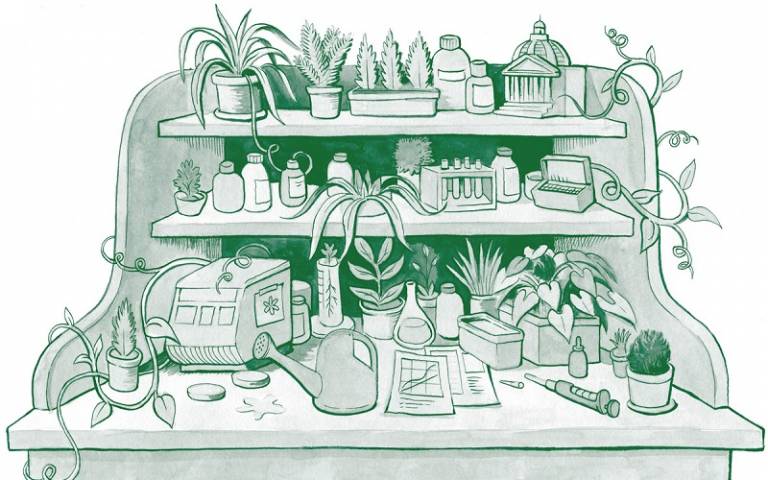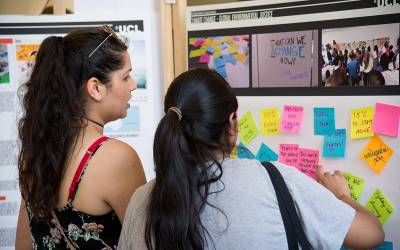Students can use the campus to test solutions to real-world sustainability challenges as part of a Living Lab project. Here are some sustainability dissertation ideas.

Dissertation topics
Living lab for a Positive Climate
Our goal is to have net zero-arbon buildings by 2024 and to be a net zero-carbon institution by 2030.
Research topics include:
- Review UCL buildings for climate change resilience and implement adaptation measures
- Research into enhancing video conferencing for large events
- Sourcing renewable energy providers for gas to enable a zero-carbon heating supply
- Research on academic travel reduction initiatives
- Research on UCL’s new Climate Accountability Scheme (combining a carbon price with behavioural nudges) to incentivise climate action by departments.
- Reducing the climate impact of UCL’s hospitality
Living lab on reducing waste and consumption
Our goal is to reduce waste per person by 20% and to become a single-use plastic-free campus by 2024.
Research topics include:
- How to eliminate plastic across UCL
- How to increase recycling at UCL (campaign)
- Labels and messaging on food
- Sustainability labels and messaging on food
Consumers are becoming more aware of sustainability considerations in food production and consumption. In addition to the traditional dietary and nutritional requirements, consumers are seeking labels and certifications to know where and how food is made, what it is made from, its carbon footprint and sustainability credentials. UCL would like to investigate what information we should supply, how this should be displayed, communicated and marketed, to allow our communities to make informed decisions and promote a flexitarian diet. It is anticipated this would require the following activity:
- Developing questionnaires for opinions on carbon footprinting, carbon pricing and other sustainability information they want to know about, to inform point-of-sale purchasing choices in outlets.
- Comparing marketing of food as “vegan” or “plant-based” and the impacts on consumer’s perceptions.
- Investigating the notion of “label fatigue “where consumers are overwhelmed by information on packaging, and the impact of the project on this.
- Baselining data on food choices.
- Developing a labelling system for packaging/ refectory display boards – using data and survey responses.
- Trialling the labelling system.
- Surveying responses.
- Recording food choices and comparing to baseline, to identify behavioural change.
Living lab on biodiversity
Our aim is to create 10,0000m2 of extra biodiverse space by 2024 – equivalent to more than one and a half football pitches as well as increasing health and wellbeing for the Bloomsbury community.
Research topics include:
- Research on different types of green infrastructure e.g. green walls, roofs, community gardens, and where UCL could implement them.
- Research on biodiversity and wildlife across UCL’s estate.
- Research on air pollution levels across UCL’s estate
Dissertation guide
Step 1: Choose your topic
- Take a look at the sustainability research topics list to see if they interest you.
- If you require data on energy, travel, procurement, UCL’s sustainability engagement programmes or water please email Sustainable UCL to request this.
- If you have alternative research topic ideas for a sustainable living lab dissertation or project please contact us.
Step 2: Discuss with your department
- Speak with your supervisor or someone in your department about undertaking a living lab dissertation and refining your topic.
- They can advise you on scales, time scales and marking criteria.
Step 3: Contact Sustainable UCL
- Arrange a meeting with Sustainable UCL to ensure your project can make a valuable contribution to UCL.
- Sustainable UCL can provide data and put you in touch with relevant operational staff such as catering members and plumbers to test out your ideas.
- You can invite your supervisor to this meeting, but it is not a requirement.
Step 4: Undertake your dissertation
- Sustainable UCL can meet a further 2 times or 2 hours maximum to support your dissertation or project.
Step 5: Sharing data and findings
- One of the principles of the Living Lab Project is to make available any additional data you generate for others to build on, so the work can keep ‘living’
- Once your dissertation is completed, we require a concise 2-3 page briefing or presentation on your findings so that we can implement your ideas onto campus or future students and staff can build on your research. Living Lab projects usually spark plenty of ideas for further research, including aspects you were not able to cover during the project.

 Close
Close


